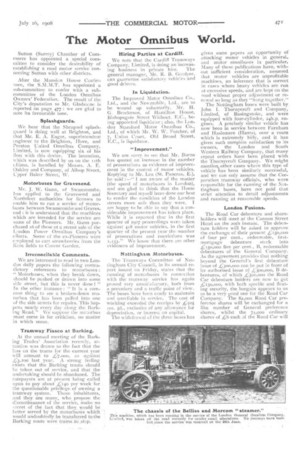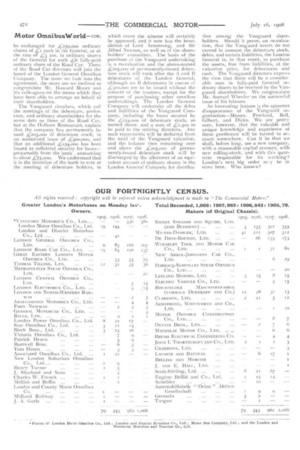The Motor Omnibus World.
Page 7

Page 8

If you've noticed an error in this article please click here to report it so we can fix it.
Sutton (Surrey) Chamber of Commerce has appointed a special committee to consider the desirability of establishing a road motor service connecting Sutton with other districts.
After the Mansion House Conference, the S.M.M.T. has appointed a sub-committee to confer with a subcommittee of the London Omnibus Owners' Federation. The result of the City's deputation to Mr. Gladstone is reported on page 477 : we are glad to note its favourable tone.
Splashguards,
We hear that the Shrapnel splashguard is doing well at Brighton, and that Mr. E. A. Eager, superintendent engineer to the Brighton, Hove, and Preston United Omnibus Company, l..imited, is now equipping six of his fleet with this device. The invention, which was described by us on the i fth ultimo., is handled by Messrs. A. E. Oakley and Company, of Allscp Street, it"pper Baker Street, W.
Motorbuses for Gravesend.
Mr. J. W. Gunn, of Swanscombe, has applied to the Gravesend and Northtleet authorities for licenses to enable him to run a service of motorbuses between Swansoambe and Gravesend : it is understood that the machines which are intended for the service are some of the Pioneers. Mr. Gunn purchased 16 of these at a recent sale of the London Power Omnibus Company's effects. Some of the ex-Pioneers were employed to cart strawberries from the Rent fields to Covent Garden.
Irreconcilable Comments.
We are interested to read in two London daily papers the following contradictory references to motorbuses : " Motorbuses, when they break down, should be pushed or drawn into some side street, hut this is never done I " In the other instance : " It is a common thing to see a broken-down motorbus that has been pulled into one of the side streets for repairs. This happens nearly every day along the Barking Road.'' We sup-pose the motorbus must come in for criticism, no matter in which sense.
Tramway Fiasco at Barking.
At the annual meeting of the Barking Trades' Association recently, attention was drawn to the fact that the lass on the trams for the current year will amount to -/-.7,000, as against f3,200 last year. A strong feeling exists that the Barking trams should he taken out of service, and that the undertaking should be abandoned. The ratepayers are at present -being called
upon to pay about per week for the questionable privilege of owning a tramway system. Those inhabitants, and they are many, who propose the discontinuance of the service, make no ,.w.ret of the fact that they would be better served by the motorbuses which would undoubtedly be transferred to the Barking route were trams ,to
Hiring Parties at Cardiff.
We note that the Cardiff Tramways Company,. Limited, is doing an increas ing business in private hire. The general manager, Mr. R. B. Goodyer, can guarantee satisfactory vehicles and good .ch ivers.
In Liquidation.
The Improved Motor Omnibus Co., Ltd., and the Newmobile, Ltd., are to be wound up voluntarily, Mr. H. G Brockman, of Hamilton House, Bishopsgate Street Without, E.C., being appointed liquidator; also, thc T.ondon Standard Motor Omnibus Co., Ltd., of which Mr. W. W. Eutcher, of 7, Union Court, Old Broad Street, B.C., is liquidator.
"Improvement."
We are sorry to see that Mr, Burns has quoted an increase in the number of prosecutions as evidence of improvement in the control of motor vehicles. Replying to Mr. Lea (St. Pancras, E.),
he said I am aware of the matter (the speed of motorbuses in London), and am glad to think that the liome Secretary and myself have done our best to Tender the condition of the London streets more safe than they were.
am happy to be able to say that a considerable improvement has taken place. While it is reported that in the first quarter of 1907 proceedings were taken against 418 motor vehicles, in the first quarter of the present year the number of prosecutions and convictions was 1,133." We know that there are other evidences of improvement.
Nottingham Motorbuses.
The Tramways Committee of Notting-ham City Council, in its annual report issued en Friday, states that the running of motorbuses in connection with the tramway service has again proved very unsatisfactory, both from a pecuniary and a traffic point of view. The buses have been costly to maintain anti unreliablein service. The cost of working exceeded the receipts by 4-:405 los. 5d., exclusive of any allowance for depreciation, or interest on capital.
The withdrawal of the three buses has
given some papers an opportunity of attacking motor vehicles in general, and motor omnibuses in particular. Many of these publications have, with-Cut sufficient consideration, assumed that motor vehicles are unprofitable machines, an inference that is correct in eases where heavy vehicles are run. at excessive speeds, and are kept on the road without proper adjustment or renewal so long as they "hang together." The Nottingham buses were built by. John I. Thornycroft and Company,. Limited, of Basingstoke, and were equipped with four-cylinder, 2.4h.p. engines. A precisely similar vehicle has now been in service between Farnham and Haslemere (Hants), over a route which is extremely hilly, and it hasgiven such complete satisfaction to its owners, the London and South. -Western Railway Company, that many repeat orders have been placed with the Thornycroft Company. We might mention,other cases where this type of vehicle has been similarly successful, and we can only assume that the Corporation tramway officials, who were responsible for the running of the Nottingham buses, have not paid that strict attention to detail adjustments and running at reasonable speeds.
London Fusions.
The Road Car debenture and sharefielders will meet at the Cannon Street Hotel on the 20th instant. The debenture holders will be asked to approve the exchange of their present Liso,000 of four per cent., .redeemable, first m-or tg age debenture stock into £150,000 five per cent., B, redeemable debentures of the General Company. As the agreement provides that nothing beyond the General's first debenture issue of L300,000 can be put in front of its authorised issue of -(..soo,000, B debentures, of which -/;500,000 the Road Car debenture holders are now to get ,,,;150,000, with both specific and floating security, the bargain appears to us to be a very good one for the Road Car Company, The 82,000 Road Car preference shares will be exchanged for a like number of General preference shares, whilst the 74,000 ordinary shares of each ,o4 the Road Car will
be exchanged for £259,000 ordinary shares of ;61 each in the General, or at the rate of ;6:3 ins. in ordinary shares of the General' for each £6 fully-paid ordinary share of the Road Car. Three of the Road Car directors will join the board of the London General Omnibus Company. The more we look into the agreement, the more are we inclined to congratulate Mr. Howard Moore arid his. colleagues on the terms which they have been able to arrange on behalf of their shareholders.
The Vanguard circulars, which call the meetings of the debenture, preference, and ordinary shareholders for the same date as those of the Road Car, but at the Holborn Restaurant, explain that the company has permanently issued L-205,000 of debenture stock, in an authorised issue of £500,000, and that an additional 1;254,000 has been issued as collateral security for loans— presumably from the bankamounting to about £75,000. We understand that it is the intention of the bank-to vote at the meeting of debenture holders, in which event the scheme will cettainly be approved, and it noW has the benediction of Lord Armstrong, and Sir Alfred Newton, as well as of the shareholders' committee. The basiS of the purchase of the Vanguard undertaking is a re-valuation and the above-named Z2o5,orto of permanently-issued debenture slo,:k will rank after the A and B debentures of the London General, although no B debentures in excess of L3oo,000 are to be issued without the consent of the trustees, except for the purpose of purchasing other omnibus undertakings. The London General Company will undertake all the debts and liabilities of the Vanguard Company, including the loans secured by the L254,000 of debenture stock, as named above, and a sum of £2,500 to be paid to the retiring directors. Any such repayments will be deducted from the total of the Vanguard valuation, and the balance then remaining over and above the £205,000 of permanently-issued debenture stock will be discharged by the allotment of an equivalent amount of ordinary shares in the London General Company for distribu Lion among the Vanguard shareholders.. Should it prove, on re-valuation, that the Vanguard assets do not exceed in amount the debenture stock, debts, and certain liabilities, the London. General is, in that event, to purchase the assets, free from liabilities, at the valuation price, for debentures and cash. The Vanguard directors express the view that there will be a considerable sum in fully-paid General ordinary shares to be received by the Vanguard shareholders. We congratulate Mr. Samuel Wheeler on the successful issue of his labours.
An interesting feature is the apparent disappearance of the Vanguard organisation—Messrs. Freeland, Bell, Gilbert, and Dicks. We are pretty sure, however, that the valuable and unique knowledge and experience of these gentlemen will be turned to account somewhere. Can it be that we shall, before long, see a new company, with a reasonable capital account, with new roiling-stock, and with this quartette responsible for its working? London's next big order nuy be in store here. Who knows?
























